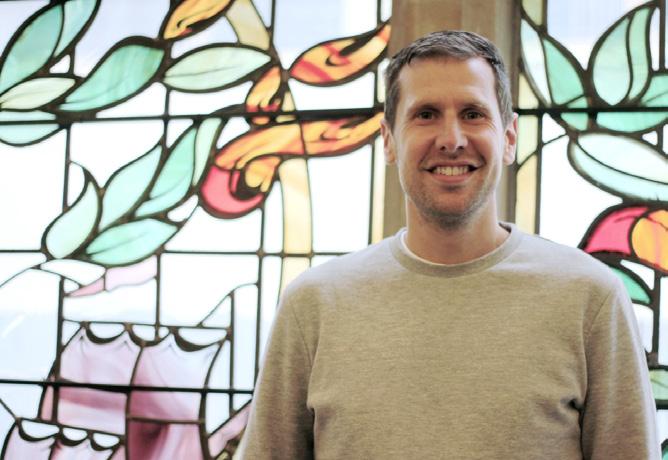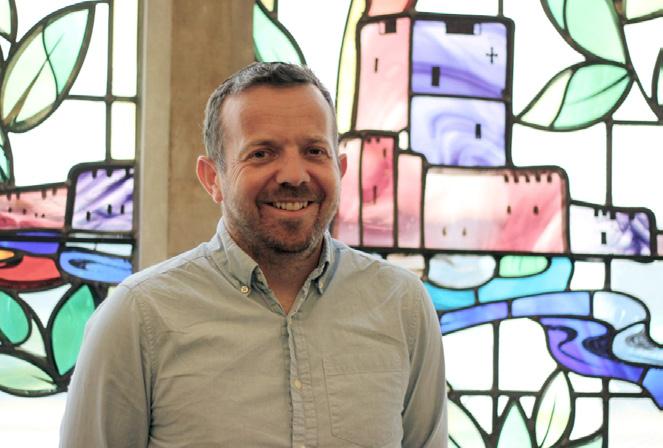
10 minute read
Refined by experience
by experience
David Thompson, PCI’s Secretary of Congregational Life and Witness, introduces some lessons that can be learnt by the pandemic.
The Covid-19 pandemic and the interruption it has brought to the normal patterns of the life and witness of the church has gone on much longer than anyone could have imagined. While so many things remain uncertain, it is still too early to come to definite conclusions about what the church has learned through the experience. However, as stories converge from across a whole variety of congregations, patterns emerge that help us begin to discern some sense of God’s refining, leading and guiding for our future.
So, what have we begun to learn about a variety of areas of church life and how might we find ourselves refined by the experience?
Discipleship refined – from spiritual dependency to sparking daily devotion
Rick Hill (PCI Discipleship and Leadership Development Officer)
Over the last year, most of my mornings have involved trying to shovel porridge into the mouth of a three-year-old. It’s clear he isn’t the biggest fan of the Quaker Oats on offer, so without our guidance, encouragement or literally forcing the spoon to his lips, he wouldn’t receive the sustenance he needs each morning. He needs us to feed him.
It can’t go on like this forever, but to help his development, we have begun to encourage him to feed himself. Currently this looks like all kinds of wonderful techniques, from countdowns to mild forms of bribery to make the process more attractive. Next to him each morning is an eight-year-old who feeds himself. While he still needs our encouragement to speed up, or reminders to talk less and eat more, it would be ridiculous if he needed us beside him all the time to prompt him to eat. He has had to learn to feed himself.
Something I found fascinating in March 2020 was the sudden explosion of daily devotional online content from congregations. Now please understand, I think it can be healthy for a congregation to guide people in their devotional life. In some ways, I wish we did it more. But I wonder if we panicked that with a lack of opportunities for teaching and fellowship, people wouldn’t know what to do on their own. Were we sparking devotional habits or depositing content? Did we jump to telling people the answers rather than ensuring we were equipping them to read the Bible for themselves?
When it comes to discipleship, perhaps our greatest need isn’t highly polished content but a mix of genuine Christian
community alongside the adoption of spiritual habits. I wonder if the circumstances of the last year and a half has taught us that we need to go beyond spoon-feeding people the answers to teaching followers of Jesus how to feed themselves. As the rhythms of people’s lives have shifted, it’s worth reflecting on whether our often frenetic organisational activity has been shaping Christian faith or creating spiritual exhaustion. Perhaps the pause caused by a pandemic has given us an opportunity to review our weekly programmes and consider how much of it is actually contributing to the growing, reaching and multiplying of disciples.
Discipleship may not always seem spectacular, but it is critical to what is fast becoming a post-Christian society seeking to shape us in its image. It revolves around letting the Word of God shape us and the people of God spark us to live his way in the face of a culture onslaught that can’t be resisted solely by an hour of passive engagement in worship once a week or an irregular engagement with reading the Bible for ourselves. We need to equip disciples with what it means to abide in Christ.
So, let’s address any imbalances of programming over presence and encourage people to rest in Jesus in a way that pays attention to his words in a culture of digital distraction. Let’s reflect on how we can spark daily habits and regular rhythms of devotion that develop awareness of Christ and fuel spiritual growth within our congregations. And let’s make sure we aren’t replicating systems of spiritual dependency, but instead equipping people to feed themselves.
PCI’s most recent ‘Proximity’ resource has been designed with this very theme in mind. Entitled ‘Habits of a Lifetime’, it explores eight different spiritual habits that help to sustain lifelong discipleship. These resources are designed to be used in the context of small group discussion or one-to-one discipleship and can be purchased through the PCI website.
The church’s presence in the community refined – come and see, go and tell
(Neil Harrison, PCI Mission Development Officer)
The church is to be the body of Christ, not only in how it includes and supports its existing members, but also in how it fleshes out a living, breathing, up-close, personal representation of the life of God to the world. Together, we all play a part in expressing this outward face of the church. That happens one-to-one
in our everyday interactions with others who don’t know Jesus, but also locally in our congregation’s active witness to the community in which it is set.
The experience of the pandemic has caused us to learn and reflect upon our congregation’s witness in the community in ways that might be helpful going forward.
Pre-pandemic, much of congregational local connection and witness has focused on regular programmes, events or services into which we sought to attract those outside the church. Lunch clubs, toddler groups and bowling clubs were part of the fabric of many congregations. Those outside church were invited into groups where they experienced the community of the church in ways that increased comfortable familiarity, hopefully growing a curiosity for the gospel along the way. Similarly, Alpha or Christianity Explored groups, or outreach services at Christmas and Easter, were opportunities throughout the year where people were invited to ‘come and see’ and discover who Jesus is and what it means to follow him.
Covid-19 and the associated restrictions has removed all of these ‘come and see’ opportunities from church life. Some have been adapted to a digital
The experience of lockdowns…allowed many people to discover a greater sense of community…in their street or area.

format, but much of that space around the edges of church life for unreached people to linger has ceased and groups or events for people to hear more about the Christian faith have not been possible.
This has led to a growing exploration among congregations of how they might encourage and equip church members to share their faith in simple ways among their friends and neighbours. The experience of lockdowns and restrictions on normal everyday life allowed many people to discover a greater sense of community and friendship in their street or area. This opened up new opportunities for believers to ‘go and tell’ others about the good news of Jesus in ways that do not require an invite to the church building.
For some time, we have been aware that as Christians most of us struggle to talk about our faith. Perhaps there is a fear of damaging a friendship or a lack of confidence in what to say. Regardless of the reason, we have privatised our faith leaving any sort of evangelism to the experts and enthusiasts. Often people need to take small steps toward Jesus over time and the most effective person to accompany them on that journey is a Christian friend who is kind, offers their time and shares how their faith makes a difference in ways that are natural and gentle.
As we experience the pandemic and its aftermath, perhaps a helpful approach to witness in the community for a congregation will include a healthy balance of ‘come and see’ groups and events, alongside an ongoing encouragement and equipping of everyday church members to ‘go and tell’ those in their lives about Jesus.
PCI has some resources to help in this area. ‘Share’ is a resource that

helps support congregations to develop their community witness, and grow in confidence in telling others about Jesus. ‘Another Look?’ is a new resource which is intended to offer a simple way to stimulate a variety of faith conversations in the autumn reconnecting phase around church, with fringe members and beyond. Both can be found on the PCI website.
(Graeme Thompson, PCI’s Youth Development Officer)
Those involved in youth ministry have had a unique opportunity recently to reflect on what really matters in their work with young people. A number of themes could be identified as having emerged, but at least three have commonly come to the fore – identity, belonging and partnership.
Many parents and youth leaders say they have never been more aware of a time that the confidence of young people has been so low. They are often now cautious in areas in which they were previously confident. Some are reluctant to go where there is a crowd, not because of fear of Covid infection, but because big groups make them feel uncomfortable. They may be hesitant to engage in something they once loved, because they now doubt their own ability.
Arguably, adolescence can be summed up by three questions: “Who am I?”, “How can I make a difference?” and “Where do I fit?” The first two of these involve personal identity and sense of purpose and relate directly to the pandemic’s impact on young people’s confidence levels. No doubt, this next period will be critical for all who work with young people as they walk with them in recovering confidence in their abilities and rediscovering their identity. Those engaged in Christian youth work must ensure in all we do that we meet young people where they are, help them frame their experiences through a gospel lens and assist them to root their identity and self-worth in who they are in Christ.
“There’s one thing this pandemic has revealed, it’s that aloneness was already alive and well. Now, we’ve fed it a steady diet of isolation for the last few months. So this monster is on steroids with no indication of slowing down,” writes Tim Eldred of Endeavor Ministries. Young people have spent too much time in their room, on their own, apart from their friends and robbed of the experiences which should define their teenage years. The summer gave many young people an opportunity to get out and reconnect with friends, take part in greatly missed activities and just rediscover a joyful sense of belonging. What is uncertain, is how many have started to emerge from isolation, or how deep is the impact of being apart.
A long time ago, youth theologian Pete Ward wrote that “relationships are the fuel on which youth ministry travels” and this truth is now in sharp focus. Youth leaders have struggled to replicate quality relationships and community through online or even socially distanced, masked activities. Even the best efforts have simply not ‘felt right’. Yet, those who have restored face-to-face activities for young people have experienced the joy of seeing reconnection. Young people do not want elaborate programmes, just a chance to be together. The months ahead will be a time of building up and building on community.
One last theme emerging from conversations about what we have learned in recent months is around how youth ministry must be a continuous partnership with parents. These have been difficult times for all parents and the amount of time young people spend at home has put a strain on even the healthiest of families. Many have seen their role, not just as parents but as disciple-makers, in a new light, becoming more aware of the significance of their impact on their teenager. Parents need the support and equipping of their church more than ever, and this will remain true in the future. As we move forward, there are many questions about how we support young people with their identity, purpose and belonging, but we must do this together as parents, youth leaders and the church.

Further resources
For more congregational resources and support during this time of refining, visit www.presbyterianireland.org/refined To keep up to date with events, training and resources sign up to the new e-quip newsletter at www.presbyterianireland.org/equip








